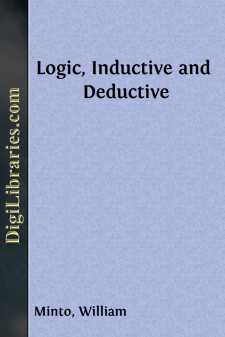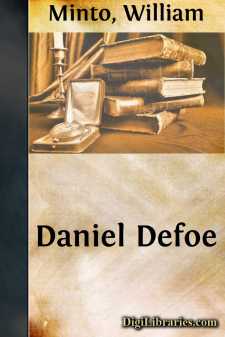Categories
- Antiques & Collectibles 13
- Architecture 36
- Art 48
- Bibles 22
- Biography & Autobiography 813
- Body, Mind & Spirit 142
- Business & Economics 28
- Children's Books 17
- Children's Fiction 14
- Computers 4
- Cooking 94
- Crafts & Hobbies 4
- Drama 346
- Education 46
- Family & Relationships 57
- Fiction 11829
- Games 19
- Gardening 17
- Health & Fitness 34
- History 1377
- House & Home 1
- Humor 147
- Juvenile Fiction 1873
- Juvenile Nonfiction 202
- Language Arts & Disciplines 88
- Law 16
- Literary Collections 686
- Literary Criticism 179
- Mathematics 13
- Medical 41
- Music 40
- Nature 179
- Non-Classifiable 1768
- Performing Arts 7
- Periodicals 1453
- Philosophy 64
- Photography 2
- Poetry 896
- Political Science 203
- Psychology 42
- Reference 154
- Religion 513
- Science 126
- Self-Help 84
- Social Science 81
- Sports & Recreation 34
- Study Aids 3
- Technology & Engineering 59
- Transportation 23
- Travel 463
- True Crime 29
William Minto
William Minto (1845–1893) was a Scottish writer, literary critic, and professor of logic and English literature at the University of Aberdeen. He is best known for his critical works and contributions to literary theory, including his analysis of prose style and narrative techniques. His notable works include "Characteristics of English Poets from Chaucer to Shirley," in which he offered insightful examinations of poets from the 14th to the 17th century, and "Manual of English Prose Literature," an influential guide on prose writing. Minto also authored novels, such as "The Crack of Doom," blending literary criticism with fiction.
Author's Books:
Sort by:
by:
William Minto
INTRODUCTION. I.—THE ORIGIN AND SCOPE OF LOGIC. The question has sometimes been asked, Where should we begin in Logic? Particularly within the present century has this difficulty been felt, when the study of Logic has been revived and made intricate by the different purposes of its cultivators. Where did the founder of Logic begin? Where did Aristotle begin? This seems to be the simplest way of...
more...
by:
William Minto
CHAPTER I. DEFOE'S YOUTH AND EARLY PURSUITS. The life of a man of letters is not as a rule eventful. It may be rich in spiritual experiences, but it seldom is rich in active adventure. We ask his biographer to tell us what were his habits of composition, how he talked, how he bore himself in the discharge of his duties to his family, his neighbors, and himself; what were his beliefs on the great...
more...



